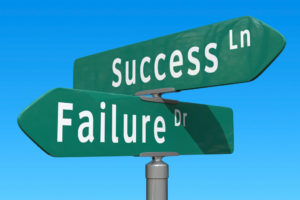At Novation, we’re entrepreneurs – every one of us stray cats. And as entrepreneurs, so often we’ve heard people te ll us: don’t be afraid to fail; fail
ll us: don’t be afraid to fail; fail
early and fail often. We smile and nod, but in reality – fail? No way! We’re not going to plan to fail. OK, OK, we know you have to plan in the event of a failure – if we should fail, now what? We know a plan is needed. But we’ll fight failure tooth and claw. We know you need to keep an eye on your plan and take corrective action so as not to fail. And we’ll do anything we can to make the corrections. But uh uh, nope – we’re not planning to fail early and often.
You know what they mean by fail early right? Well, it means it is better to fail near the beginning of the process – the design or prototype stage. Typically you will not have put in too much of an investment in time and money, so you can either drop it or go back to the proverbial drawing board without much penalty. If you fail after you’ve put in tons time and money it is a disaster. You don’t what to have to recall your products, make corrections, change tooling. It’s costly. It’s also costly to get to market and find out no one wants to pay the price of your products. That’s why you need to talk to customers, create a market, before you get too far along. Best thing to do is work hard at your design, talk to potential customers, and make sure the product will be a success…don’t fail at all. Do your design work. Do your market research. Don’t fail even at the beginning. But we admit, while we hate the term “fail early”, if you’re going to find flaws in your product or market, best to find them early on ‘cause it is so much less costly to fix it all. But don’t plan to fail. Plan on doing a great job early on so you have no failures.
So as long as you don’t plan to “fail early” it makes some sense as long if it means to look for issues ASAP and take care of them. But “fail often”? Are you kidding me? This has no redeeming value at all…well, unless it really means in the design process try out several different approaches, and examine multiple market concepts. That’s OK. That’s a legit part of the product development process. Just make sure you know it doesn’t mean it is fine to start companies, take investors’ money, and keep doing it as long as you can. You might be gaining interesting experience, but you’re losing someone’s money and time. It’s not right. Don’t fail often! It is plain wrong.
OK, so maybe we misunderstood those failure phrases a little, but hopefully you understand our issues. We’re never going into any venture where failure of the product/enterprise is considered acceptable. Never.
